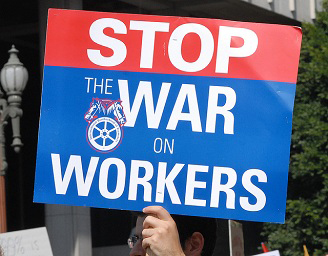- Home
- News
- Features
- Topics
- Labor
- Management
- Opinions/Blogs
- Tools & Resources
This Week In The War On Workers- “Comp Time” Eric Cantor’s Plan To Give Bosses Added Power Over The Clock
By LAURA CLAWSON for Daily Kos Labor— Part of Eric Cantor’s big Republican rebranding agenda is to pass the Working Families Flexibility Act, which would let employers replace paying time and a half for overtime hours worked with offering comp time. Of course, it’s branded as offering workers more choice.
But there are a few problems with that. Working America’s Doug Foote counts seven.
For instance:
“Comp time” encourages mandatory overtime – and ends overtime pay as we know it. Instead of time-and-a-half pay for hours worked past 40, workers would get “comp time,” hours of time off to be taken later.
Employers benefit because they don’t have to pay overtime, plus, they can have you use your comp time in a way that won’t cost them extra (during less busy periods, etc.).
According to the bill, individual employees have the “choice” between comp time or overtime pay.
Since comp time saves the employer money, what is stopping them from inducing workers, subtly or not, into choosing comp time?
They could give the “comp time” workers better shifts and better treatment, and they could even train workers not to take the overtime options – in the same way that Target and other stores train workers not to join unions.
Workers could also end the year not having used all their comp time (especially if their bosses make it difficult to schedule) and lose it.
And don’t forget—no one would get that comp time until they’d worked overtime and not been paid as much for it as they would be now.
Women would likely bit hit especially hard by this law, since they tend to bear more of the workload at home and more responsibility for children.
In fact, time issues are one reason for occupational segregation, a new study finds. Sarah Jaffe explains that Indiana University’s Youngjoo Cha:
[…] found that 6.8% of the mothers surveyed who worked 50 hours a week or more in male-dominated fields ended up exiting those jobs within four months, compared to 4.3% of women without children. (The percentage of men leaving those professions was just slightly over 2%, whether they had children or not.)
Having children, the report notes, increases the odds of a woman leaving a male-dominated field where she is expected to work 50 hours or more by 52%.
Cha explains to Working in These Times that women who have care-giving responsibilities at home are less likely to be able to work all day long, and care work is still seen as a woman’s job—in her paper, Cha cites a 2012 study that found that even women who make more money than their spouses spend 30% more time with their children.
Yet male-dominated occupations—which still, Cha notes, pay more than female-dominated ones—demand long hours of workers.
Fields like law or medicine expect total commitment, and even skilled blue-collar jobs tend to require longer work hours and lots of overtime.
The expectation that workers will be able to stay on the job longer, combined with the expectation that women will do most of the care-giving, leads to more women leaving those male-dominated fields, either exiting the labor force entirely or finding a job that doesn’t have the same kinds of demands.
Time is an intensely political issue, though it’s not always recognized as such. Eric Cantor is recognizing that—and, true to form, trying to give employers more power over workers’ lives.
A Fair Day’s Wage
- The Labor Department is telling Florida that the state’s harsh unemployment insurance law violates civil rights.
- The collapse of an industrial building in Bangladesh has killed at least 238, a number that will likely rise. In the face of that tragedy, Matt Yglesias, who will get no links from me for this blatant linkbait, suggested that it’s just dandy for Bangladesh to have weak workplace safety laws because that’s the way for Bangladeshi workers to have jobs—if their lives are seen as disposable.
In response, Erik Loomis takes him to the woodshed:
There’s also the issue of democracy and choice. What are workers actually choosing when they make these theoretical choices to enter the plant?
The choice many tried to make was not to work in unsafe conditions. They were threatened with severe pay loss that placed their families’ already precarious economic system in even more danger.
Bangladeshi workers have tried to organize into unions. What happened?
Their organizers were murdered.
The building is owned by a local political elite. What chance did workers have to create change?
Workers try to make choices.
Those choices are denied them by an international corporate-political alliance. The choices are made for workers by Wal-Mart, by their corrupt elites, by the bullet from a police officer’s gun.
Not only was what Yglesias wrote shockingly immoral, he also got some things just plain factually wrong, as Loomis shows. Read the whole thing.
- A New York City transit worker was struck by a train and killed. Louis Moore, 58, was the first transit worker killed on the job in the city since 2010.
- Union workers will do much of the construction of a new casino in Baltimore, Maryland, and now it’s looking like the casino may also bring permanent union jobs to the area.
- Six policies to help the middle class that won’t cost taxpayers a penny. Not that we shouldn’t be talking about policies that would cost taxpayers pennies but benefit said taxpayers and the nation as a whole in the long run…
- Republicans in the Florida state legislature are still pushing the bill to preempt city and county paid sick leave laws. Ugh, Florida Republicans. Just ugh.
- How did the Boston shutdown affect worker paychecks?
“Most low wage workers can’t afford to lose a day’s pay, and there’s no doubt this lockdown will adversely impact the city’s working poor,” said Jessica Kutch, a labor activist who co-founded the organizing site coworker.org, in an email to Salon.
“I’d really like to see employers state on the record that their hourly workers will be paid for the time they were scheduled to work today — but I suspect that most employers will place the burden of this shutdown squarely on the backs of people who can least afford it.”
Some workers may be forced to use their paid time off or vacation time for Friday, labor activists fear.
An employee of Boston Children’s Hospital tweeted that HR was requiring employees to use their vacation time during the lockdown, but eventually backed down some internal pushback.
It would be good to see some naming-and-shaming here.
- Meet some of the 8% of American households—and 20% of African American and Latino households—without bank accounts.
Education
-
We read a lot about how much of their class time kids are spending taking standardized tests, and how the results of those tests are determining teachers’ fates. But here’s a take on standardized testing that is both more of the same and something new: how testing impacts a school for the deaf.
- The awesomeness that is cyber schooling:
While the Pittsburgh Online Academy has had 144 students in grades 6-12 since it opened last fall, only 47 are still enrolled. That includes only 17 of the original 55.
“I think it has to do with fit,” said Mark McClinchie, district coordinator of virtual learning. “I think in Pennsylvania we’re in an environment where we’ve oversold the idea of online learning, and this is coming from someone who runs one.”
- Chicago teachers forced to work a longer day have gotten a settlement giving them back pay for the extra time.
- New York City public advocate and mayoral candidate Bill de Blasio is calling for an investigation into Eva Moskowitz’s Success Academy.
- Charter school teachers organized a union at Ivy Academia in Los Angeles.
This Week In The War On Workers: Eric Cantor’s Plan To Give Bosses Added Power Over The Clock
Originally published on Daily Kos.com and Daily Kos Labor
List your business in the premium web directory for free This website is listed under Human Resources Directory






